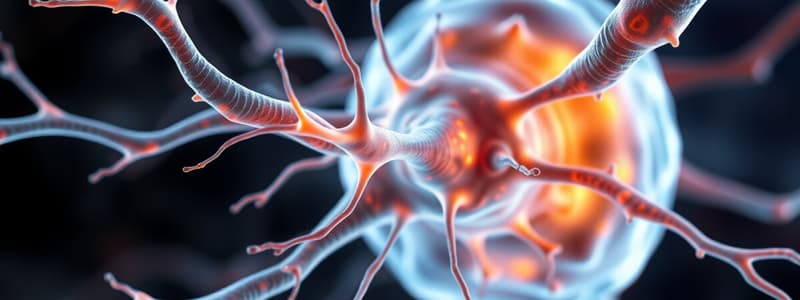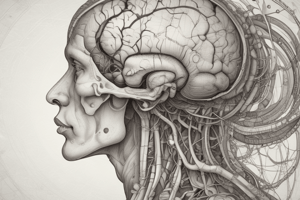Podcast
Questions and Answers
What is the primary function associated with the occipital lobe?
What is the primary function associated with the occipital lobe?
- Thinking and cognition
- Memory and language
- Sensation
- Visual perception (correct)
What is a primary function of the association areas in the cerebral cortex?
What is a primary function of the association areas in the cerebral cortex?
- Controlling voluntary movements
- Producing neurotransmitters
- Regulating sensory perception
- Integrating diverse information (correct)
Which structure separates the temporal lobe from the parietal lobe?
Which structure separates the temporal lobe from the parietal lobe?
- Central sulcus
- Lateral sulcus (correct)
- Parieto-occipital sulcus
- Longitudinal fissure
Which of the following statements about the cerebral cortex is FALSE?
Which of the following statements about the cerebral cortex is FALSE?
Which lobe is primarily responsible for higher cognitive functions such as thinking and movement?
Which lobe is primarily responsible for higher cognitive functions such as thinking and movement?
What anatomical feature separates the cerebral hemispheres from the cerebellum?
What anatomical feature separates the cerebral hemispheres from the cerebellum?
What divides the brain into the left and right cerebral hemispheres?
What divides the brain into the left and right cerebral hemispheres?
How many structurally different areas have been assigned numbers within the cerebral cortex according to Brodmann?
How many structurally different areas have been assigned numbers within the cerebral cortex according to Brodmann?
Which lobe, buried deep in the lateral sulcus, is involved in functions related to emotion and language?
Which lobe, buried deep in the lateral sulcus, is involved in functions related to emotion and language?
What does the term 'homunculus' refer to in relation to the cerebral cortex?
What does the term 'homunculus' refer to in relation to the cerebral cortex?
What is the primary function of specialized cells in the nervous system?
What is the primary function of specialized cells in the nervous system?
How many pairs of cranial nerves are involved in head innervation?
How many pairs of cranial nerves are involved in head innervation?
What are the two primary subdivisions of the nervous system?
What are the two primary subdivisions of the nervous system?
What is the role of the integration process in the nervous system?
What is the role of the integration process in the nervous system?
What are the two main outputs of the nervous system related to impulse transfer?
What are the two main outputs of the nervous system related to impulse transfer?
Which structure is primarily responsible for the correlation and integration of nervous information?
Which structure is primarily responsible for the correlation and integration of nervous information?
What does the term 'motor output' refer to in the context of the nervous system?
What does the term 'motor output' refer to in the context of the nervous system?
What substance surrounds the brain and spinal cord, providing protection?
What substance surrounds the brain and spinal cord, providing protection?
Which part of the nervous system directly involves the regulation of involuntary structures such as the heart?
Which part of the nervous system directly involves the regulation of involuntary structures such as the heart?
Which two divisions make up the Autonomic Nervous System?
Which two divisions make up the Autonomic Nervous System?
What is the primary function of the Sympathetic Nervous System?
What is the primary function of the Sympathetic Nervous System?
Which statement accurately describes the Enteric Nervous System?
Which statement accurately describes the Enteric Nervous System?
What is the relationship between the Peripheral Nervous System and the Central Nervous System?
What is the relationship between the Peripheral Nervous System and the Central Nervous System?
Which type of muscle is NOT innervated by the Autonomic Nervous System?
Which type of muscle is NOT innervated by the Autonomic Nervous System?
How does the Parasympathetic Nervous System mainly affect the body?
How does the Parasympathetic Nervous System mainly affect the body?
What main structures are included in the Peripheral Nervous System?
What main structures are included in the Peripheral Nervous System?
Which area of the brain is primarily responsible for voluntary eye movement?
Which area of the brain is primarily responsible for voluntary eye movement?
What is the role of Wernicke's area in the brain?
What is the role of Wernicke's area in the brain?
Which part of the spinal cord corresponds to sensory and motor innervation of the lower extremities?
Which part of the spinal cord corresponds to sensory and motor innervation of the lower extremities?
What is the primary function of the ventral horn in the spinal cord?
What is the primary function of the ventral horn in the spinal cord?
Which structure runs from the foramen magnum to the lumbar level L1/L2?
Which structure runs from the foramen magnum to the lumbar level L1/L2?
What type of conduction pathway does the spinal cord primarily provide?
What type of conduction pathway does the spinal cord primarily provide?
Which of the following structures is involved in the innervation of the upper extremities?
Which of the following structures is involved in the innervation of the upper extremities?
Which area of the brain is NOT primarily involved in language processing?
Which area of the brain is NOT primarily involved in language processing?
Flashcards are hidden until you start studying
Study Notes
Overview of the Nervous System
- Composed of specialized cells for sensory stimuli reception and transmission to muscles and glands.
- Two main divisions: Central Nervous System (CNS) and Peripheral Nervous System (PNS).
- Functional unit: Neurons; capable of receiving, conducting, and transmitting impulses.
Central Nervous System (CNS)
- Includes the brain and spinal cord, suspended in cerebrospinal fluid (CSF).
- Functions in integration and processing of nervous information.
- Protected by the meninges, a system of membranes.
Peripheral Nervous System (PNS)
- Comprised of cranial and spinal nerves, extending from the CNS.
- Conducts information to and from the CNS.
- Contains 12 pairs of cranial nerves and 31 pairs of spinal nerves.
Autonomic Nervous System
- Innervates involuntary structures like the heart, smooth muscles, and glands.
- Distributed throughout both CNS and PNS.
- Divided into Sympathetic (fight-or-flight response) and Parasympathetic (rest-and-digest) systems.
- Includes the Enteric Nervous System, regulating digestion.
Cerebral Hemispheres
- Divided by the longitudinal fissure into left and right hemispheres.
- Four main lobes:
- Occipital lobe: visual perception.
- Parietal lobe: sensation.
- Frontal lobe: cognition and movement.
- Temporal lobe: memory, language, and emotion.
- Insula located deep in the lateral sulcus.
- Central sulcus (Rolando) separates frontal and parietal lobes.
- Parieto-occipital sulcus divides occipital and parietal lobes.
Cerebral Cortex
- Responsible for executive functioning, approximately 2-4 nm thick.
- Lacks fiber tracts; consists of gray matter (neuron cell bodies, neuroglial cells, dendrites, capillaries).
- Organized into Brodmann areas (52 structurally different areas).
Functional Areas of the Cerebral Cortex
- Sensory areas: involved in perception.
- Motor areas: control movement.
- Association areas: integrate information for purposeful action.
- Homunculus representation for sensory and motor function mapping.
Language and Speech Areas
- Broca’s area: responsible for speech production.
- Wernicke’s area: crucial for language comprehension and modification.
- Involvement of frontal lobe, basal ganglia, cerebellum, and pons in language processing.
Spinal Cord Characteristics
- Cylindrical structure of nervous tissue, with white matter surrounding gray matter.
- Regions of the spinal cord include:
- Ventral horn: somatic motor function neurons.
- Lateral horn: preganglionic sympathetic axons.
- Extends from foramen magnum to lumbar level L1/L2.
Spinal Cord Functions
- Provides sensory and motor innervation to the body below the head via spinal nerves.
- Serves as a two-way conduction pathway (ascending for sensory, descending for motor signals).
- Contains cervical and lumbar enlargements for upper and lower extremity innervation, respectively.
Studying That Suits You
Use AI to generate personalized quizzes and flashcards to suit your learning preferences.



